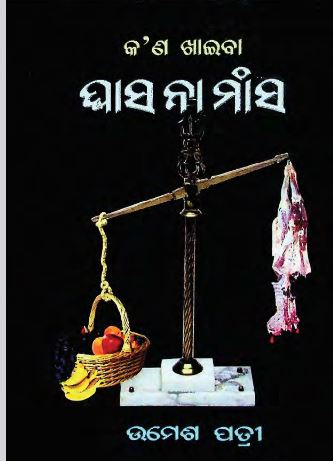Kana Khaiba, Ghasa Na Mansa,a notable work by Umes Patri published in 2010, stands out in the realm of Odia literature for its thought-provoking exploration of dietary choices and the moral implications behind them. This essay book delves deeply into the dichotomy between vegetarianism and non-vegetarianism, skillfully weaving together personal anecdotes, cultural reflections, and philosophical inquiries.
At its core, the book raises critical questions about our relationship with food and the ethical dimensions of our eating habits. Umes Patri, with his eloquent prose and keen insights, invites readers to reflect on what they consume and the broader consequences of their choices. The title itself, which translates to “What to Eat: Grass or Flesh,” encapsulates the essence of the debate between vegetarianism and non-vegetarianism, presenting a compelling case for introspection.
In the first sub-essay, Patri tackles the topic of non-vegetarianism, examining the reasons many people indulge in meat consumption. He addresses various cultural, social, and economic factors that contribute to this practice, highlighting how deeply ingrained traditions and culinary preferences can shape one’s worldview. By weaving in personal stories and anecdotes, the author emphasizes the complexities surrounding non-vegetarian diets. While acknowledging the nutritional benefits of meat, he also lays bare the ethical ramifications tied to animal killing, provoking readers to consider the moral weight of their choices.
Contrasting the previous sub-essay, the segment on vegetarianism presents a more compassionate perspective on food choices. Umes Patri draws on historical and cultural evidence supporting the virtues of a vegetarian lifestyle, emphasizing its alignment with principles of non-violence and compassion. He discusses the emotional and spiritual connections individuals often have with animals, positing that a vegetarian diet promotes a harmonious relationship with the environment. Through vivid descriptions of plant-based meals and the simple joys of vegetarian cooking, Patri illustrates that this lifestyle can be both fulfilling and nutritious.
A pivotal theme of “Kana Khaiba, Ghasa Na Mansa” is the exploration of violence—not just in the act of killing animals for food but also in the broader context of how society views violence in general. Umes Patri critically examines how our dietary choices can reflect and reinforce violent behaviors, prompting readers to consider the ethical responsibilities tied to their consumption patterns. He argues that choosing vegetarianism over non-vegetarianism can be seen as a rejection of violence, urging readers to adopt practices that foster peace, empathy, and coexistence with all living beings.
Kana Khaiba, Ghasa Na Mansa is not just a dietary guide but a profound philosophical journey into the ethics of eating. Umes Patri’s engaging prose and insightful examination of the complexities surrounding vegetarian and non-vegetarian choices resonate deeply with readers, regardless of their dietary preferences. The book serves as a call to action, encouraging individuals to confront their beliefs about food and the implications of their choices on the world around them. By exploring themes of compassion, violence, and the cultural significance of dietary habits, “Kana Khaiba, Ghasa Na Mansa” stands as a crucial contribution to contemporary Odia literature, inviting readers to cultivate a deeper awareness of their relationship with food.
Books Info
| Books name | Kana Khaiba Ghasa Na Mansa |
| Author | Umes Patri |
| No Of pages | 90 |
| Publisher | Baidika Prakashana |
| Publication | 2010 |
| Printed At | Global Printers |
| Distributor | NA |

